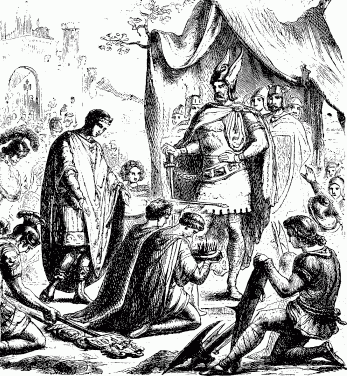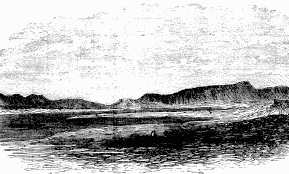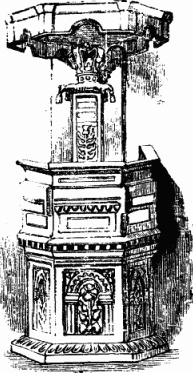
Avitus was a good man, but the Romans grew weary of him, and in the year 457 they engaged Ricimer, a chief of the Teutonic tribe called Suevi, to drive him out, when he went back to Gaul, where he had a beautiful palace and garden. After ten months Ricimer chose another Sueve to be Emperor. He had been a captain under Aëtius, and had the Roman name of Majorian. He showed himself brave and spirited; led an army into Spain and attacked Genseric; but he was beaten, and came back disappointed. Ricimer was, however, jealous of him, forced him to resign, and soon after poisoned him.
After this, Ricimer really ruled Italy, but he seemed to have a sort of awe of the title of Cæsar Augustus, the Emperor, for he forbore to use it himself, and gave it to one poor weak wretch after another until his death in 472. His nephew went on in the same course; but at last a soldier named Orestes, of Roman birth, gained the chief power, and set up as Emperor his own little son, whose Christian name was Romulus Augustus, making him wear the purple and the crown, and calling him by all the titles; but the Romans made his name into Augustulus, or Little Augustus. At the end of a year, a Teutonic chief named Odoacer crossed the Alps at the head of a great mixture of different German tribes, and Orestes could make no stand against him, but was taken and put to death. His little boy was spared, and was placed at Sorrento; but Odoacer sent the crown and robes of the West to Zeno, the Eastern Emperor, saying that one Emperor was enough. So fell the Roman power in 476, exactly twelve centuries after the date of the founding of Rome. It was thought that this was meant by the twelve vultures seen by Romulus, and that the seven which Remus saw denoted the seven centuries that the Republic stood. It was curious, too, that it should be with the two names of Romulus and Augustus that Rome and her empire fell.
Odoacer called himself king, and, indeed, the Western Empire had been nearly all seized by different kings—the Vandal kings in Africa, the Gothic kings in Spain and Southern Gaul, the Burgundian kings and Frank kings in Northern Gaul, the Saxon kings in Britain. The Ostro or Eastern Goths, who had since the time of Valens dwelt on the banks of the Danube, had been subdued by Attila, but recovered their freedom after his death. One of their young chiefs, named Theodoric, was sent as a hostage to Constantinople, and there learned much. He became king of the Eastern Goths in 470, and showed himself such a dangerous neighbor to the Eastern Empire that, to be rid of him the Emperor Zeno advised him to go and attack Odoacer in Italy. The Ostrogoths marched seven hundred miles, and came over the Alps into the plains of Northern Italy, where Odoacer fought with them bravely, but was beaten. They besieged him even in Ravenna, till after three years he was obliged to surrender and was put to death.

Rome could make no defence, and fell into Theodoric's hands with the rest of Italy; but he was by far the best of the conquerors—he did not hurt or misuse them, and only wished his Goths to learn of them and become peaceful farmers. He gave them the lands which had lost their owners; about thirty or forty thousand families were settled there by him on the waste lands, and the Romans who were left took courage and worked too. He did not live at Rome, though he came thither and was complimented by the Senate, and he set a sum by every year for repairing the old buildings; but he chiefly lived at Verona, where he reigned over both the Eastern and Western Goths in Gaul and Italy.
He was an Arian, but he did not persecute the Catholics, and to such persons as changed their profession of faith to please him he showed no more favor, saying that those who were not faithful to their God would never be faithful to their earthly master. He reigned thirty-three years, but did not end as well as he began, for he grew irritable and distrustful with age; and the Romans, on the other hand, forgot that they were not the free, prosperous nation of old, and displeased him. Two of their very best men, Boëthius and Symmachus, were by him kept for a long time prisoners at Rome and then put to death. While Boëthius was in prison at Pavia, he wrote a book called The Consolations of Philosophy, so beautiful that the English king Alfred translated it into Saxon four centuries later. Theodoric kept up a correspondence with the other Gothic kings wherever a tribe of his people dwelt, even as far as Sweden and Denmark; but as even he could not write, and only had a seal with the letters [Greek: THEOD] with which to make his signature, the whole was conducted in Latin by Roman slaves on either side, who interpreted to their masters. An immense number of letters from Theodoric's secretary are preserved, and show what an able man his master was, and how well he deserved his name of "The Great." He died in 526, leaving only two daughters. Their two sons, Amalric and Athalaric, divided the Eastern and Western Goths between them again.
Seven Gothic kings reigned over Northern Italy after Theodoric. They were fierce and restless, but had nothing like his strength and spirit, and they chiefly lived in the more northern cities—Milan, Verona, and Ravenna, leaving Rome to be a tributary city to them, where there still remained the old names of Senate and Consuls, but the person who was generally most looked up to and trusted was the Pope. All this time Rome was leavening the nations who had conquered her. When they tried to learn civilized ways, it was from her; they learned to speak her tongue, never wrote but in Latin, and worshipped with Latin prayers and services. Far above all, these conquerors learned Christianity from the Romans. When everything else was ruined, the Bishop and clergy remained, and became the chief counsellors and advisers of many of these kings.

It was just at this time that there was living at Monte Casino, in the South of Italy, St. Benedict, an Italian hermit, who was there joined by a number of others who, like him, longed to pray for the sinful world apart rather than fight and struggle with bad men. He formed them into a great band of monks, all wearing a plain dark dress with a hood, and following a strict rule of plain living, hard work, and prayers at seven regular hours in the course of the day and night. His rule was called the Benedictine, and houses of monks arose in many places, and were safe shelters in these fierce times.
